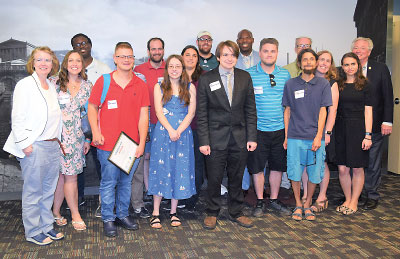Peer Specialists With Autism Have Insight Few Others Possess
Abstract
People with the lived experience of autism can help others with the disorder navigate the critical transition from adolescence to adulthood.
Across the United States and elsewhere, individuals who have recovered from a mental health and/or substance use problem are being increasingly recognized for the important role they can play in helping others with mental health and substance use disorders. Peer specialists can now be found in inpatient hospitals, emergency rooms, VA centers, and more.

The first cohort of the Community Autism Peer Specialist (CAPS) training program (pictured along with stakeholders who helped make CAPS happen) celebrate their program completion, ready to help others with autism spectrum disorder successfully navigate school, work, and life
Lindsay Shea, Dr.Ph., director of the Policy and Analytics Center at the A.J. Drexel Autism Institute in Philadelphia, said one area she’d like to see peer specialist growth is in support of individuals with autism spectrum disorder (ASD).
“There is a lot of emphasis on school-based models where neurotypical peers will offer guidance or counseling to individuals with ASD,” and these programs can be instrumental in helping young people with ASD improve academic or social skills, she said. “But having someone with lived experience of ASD to help you navigate school and life would be such an exceptional asset,” she continued.
Shea helped establish the Community Autism Peer Specialist (CAPS) program in Pennsylvania, which provides training for ASD-tailored peer services.
To participate in the CAPS program, peer specialists must be at least 18, have lived experience with ASD, and have employment or postsecondary education experience. The specialists receive about 75 hours of training, including lectures, learning assignments, and virtual job shadowing.
Like other peer specialist programs, CAPS trainees learn to use their life experience to empower other teens or adults with ASD and encourage such behaviors as self-care, independent living, and community engagement. Graduates of the program are certified as peer support specialists and can work in schools, social service centers, and community wellness programs.
In 2021, the Pennsylvania Office of Mental Health and Substance Abuse Services approved the CAPS program as a Medicaid Supplemental Service for Community Behavioral Health (CBH) members in Philadelphia County.
“By rooting our program in the Medicaid system, we are primed to serve marginalized communities and individuals who may have no other services,” Shea said.
Four graduates of the CAPS program currently work with about 40 people with ASD who live in the Philadelphia area. According to Shea, about 30 additional people are enrolled in the program to become peer specialists.
While the CAPS curriculum continues to evolve and expand, “we have made an incredible amount of progress over just a few years,” Shea said. “We’ve also had groups from many other states reach out to learn more.”
Old Perceptions of Autism Linger
Despite the promise of CAPs, peer specialists with ASD can face an uphill battle, explained Kristen Gillespie-Lynch, Ph.D., an associate professor of psychology at the College of Staten Island (part of the City University of New York).
“Many researchers and health professionals remain glued to outdated theories of people with autism,” she told Psychiatric News. One such belief involves the psychological concept of “theory of mind,” or the ability for individuals to put themselves in another person’s shoes. While individuals with ASD can have some difficulty with theory of mind, “the idea that they lack the empathy or social bonding to be an effective peer specialist is stigmatizing and infantilizing,” she said.
As with any condition, people with ASD have varying abilities, she continued. Gillespie-Lynch co-developed a program called Project REACH more than a decade ago that supports students with ASD and other disabilities who attend the City University of New York.
Among the components of Project REACH is a mentoring program called Building Bridges, which pairs new students with autism with older peers with lived experience. The mentors help the new students gain confidence and learn how to advocate for themselves. Project REACH also includes group workshops that teach skills students say they would like to learn, including self-regulation, communication, and time management skills. Autistic students are invited to take on leadership roles throughout Project REACH as mentors, group leaders, public speakers, and/or researchers, to the degree that they are interested in doing so.
“One of the goals we set out when developing REACH was to ensure it was participatory,” Gillespie-Lynch said. That is, beyond just receiving training, students with autism are also involved in the planning, implementation, and evaluation of REACH initiatives.
“Project REACH was a wonderful program that helped me grow as a person and learn about the world,” said Bella Kofner, M.S.Ed., a recent graduate of the College of Staten Island who was a REACH mentee and mentor. “I was treated as an individual and not as a baby.”
Kofner is a prime example of how learning to advocate for oneself can pay long-term dividends. “I have the confidence now to share my autism story with others, and encourage them that they can not only survive, but also thrive in school or at the workplace.”
Gillespie-Lynch is proud of all the work her REACH trainees have done and is happy to see that similar programs have been popping up at other universities. “More and more autistic individuals are going to college, and it is important to support them during this transition period into adulthood,” she said.
Shea agreed that more support services for people with ASD are needed.
“As a field, we are still reconciling that autism persists throughout the lifespan,” she said. “[W]e need more conversations about adult autism care, and a role for people with lived experience is an essential part of that conversation.” ■



